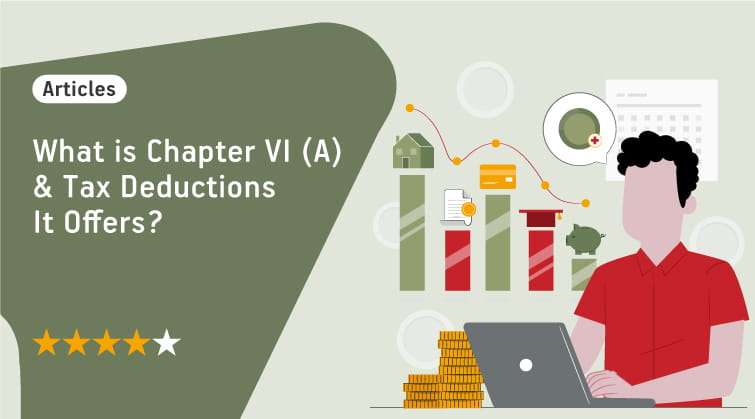Section |
Eligible Deductions |
80C |
Deductions for investments like PPF, EPF, and more. |
80CCC |
Deductions for contributions to pension plans. |
80CCD |
Deductions for contributions to the National Pension System (NPS). |
80CCE |
Applicability of deductions under sections 80CCF, 80CCG, and 80CCH. |
80D |
Deductions for medical insurance premiums. |
80DD |
Deductions for expenses on the maintenance of a disabled dependent. |
80DDB |
Deductions for specific medical treatments. |
80E |
Deductions on interest paid on education loans. |
80G |
Deductions for contributions made to charitable organizations that have been approved. |
80GG |
Deductions for house rent paid if HRA is not received. |
80GGA |
Deductions for donations for scientific research or rural development. |
80GGC |
Deductions for contributions to political parties. |
80IA |
Deductions for profits from specified businesses. |
80IB |
Deductions for profits from certain industrial undertakings. |
80JJAA |
Deductions for employment of new employees. |
80P |
Deductions for income from specified co-operative societies. |
80RRB |
Deductions for income from patents. |
80TTA |
Deductions on interest income from savings accounts. |
80U |
Deductions for individuals with disabilities. |
Section 80C: Section 80C offers deductions for expenses such as life insurance premiums, deferred annuities, provident fund contributions, and investments in specific equity shares or debentures. The maximum deduction allowed is Rs 1.5 lakh, combined with sections 80CCC and 80CCD(1).
Section 80CCC: Section 80CCC is dedicated to deductions related to contributions to pension schemes. When considered alongside 80C and 80CCD(1), the total deduction limit remains at Rs 1.5 lakh.
Section 80CCD(1): Taxpayers can claim deductions for contributions made to the central government's pension funds. The maximum deduction allowed is Rs. 1.5 lakh. If you're an employee, 10% of your basic salary and dearness allowance are tax-exempt. In other cases, 20% of total income enjoys tax benefits, but the limit remains Rs. 1.5 lakh.
Section 80CCD(1B): Chapter VI-A deductions for this subsection apply to pension schemes like the National Pension System (NPS), NPS Swavalamban, and Atal Pension Yojana. Tax exemption in this scenario is capped at Rs. 50,000.
Section 80CCD(2): Taxpayers can claim deductions for contributions made by their employer to the Central Government's pension scheme. The tax benefit is granted on 14% of the employer's contribution if it's made by the Central Government, and 10% if it's made by any other employer.
Section 80D: This section of the income tax allows both individuals and Hindu Undivided Families (HUFs) to claim deductions for medical expenses. These expenses encompass medical insurance premiums, medical expenditures, and the cost of preventive health checkups.
Section 80DD: This section provides deductions for the maintenance and medical treatment of dependents with disabilities. The highest deduction limit is Rs 75,000.
Section 80DDB: Taxpayers can claim deductions of up to Rs 40,000 for medical treatment expenses related to specified diseases. These expenses must be incurred under the care of specialists such as urologists, hematologists, neurologists, oncologists, immunologists, or others as prescribed.
Section 80E: Deduction for interest on student loans with no upper limit under section 80E.
Section 80EE: Interest paid on a loan for a residential property is deductible up to Rs 50,000.
Section 80EEA: Deduction for interest on loans taken for specific residential properties (on affordable housing) up to Rs 1.5 lakh under section 80EEA.
Section 80EEB: Deduction for interest on loans taken to buy electric vehicles up to Rs 1.5 lakh under section 80EEB.
Section 80G: Contributions to certain organizations, charities, etc. The restriction can range from 100% of the overall donation to 50% of the total donation or 50% of the donation with a limitation of 10% of gross income, depending on the kind of donee.
Section 80GG: Rent paid by non-salaried individuals who do not receive HRA benefits is deductible under section 80GG. The maximum deduction is Rs 5,000 per month or 25% of your annual income, whichever is smaller.
Section 80GGA: Offers full deductions for certain donations made towards scientific research or rural development.
Section 80GGC: Provides full deductions for donations to Political Parties, but it applies specifically to non-cash donations.
Section 80TTA: Grants deductions for interest earned on savings bank accounts, up to Rs 10,000, applicable to taxpayers other than Resident senior citizens.
Section 80TTB: Offers deductions for interest earned on deposits, up to Rs 50,000, specifically for Resident senior citizens.
Section 80U: Provides deductions for individuals with disabilities, with the extent of deduction varying based on individual circumstances.





 1800-270-7000
1800-270-7000




